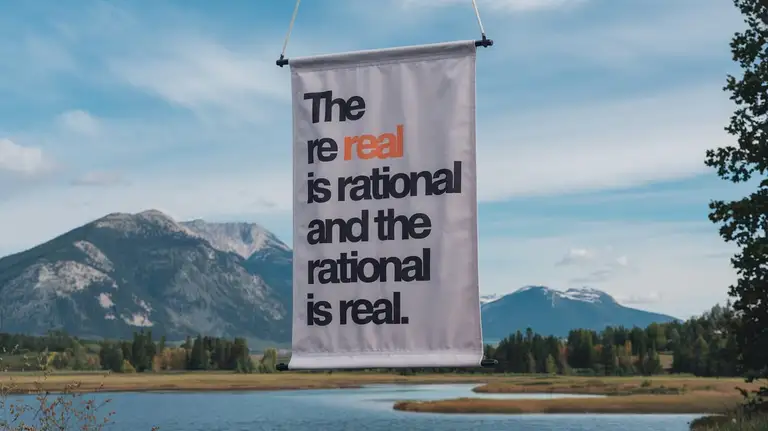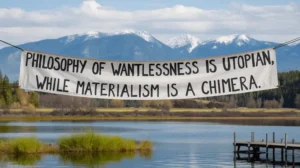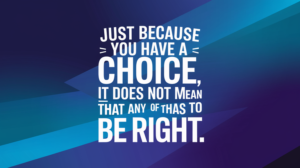This famous philosophical assertion by German philosopher G.W.F. Hegel presents a profound connection between reality and rationality. Hegel suggests that what is real, or what exists, follows a rational structure. In turn, what is rational—governed by logic and reason—is reflected in reality. This idea challenges the notion that reality and reason are separate, implying that the world, as we perceive it, unfolds according to logical and rational principles. In this essay, we will explore the meaning of this statement, its philosophical implications, and how it relates to our understanding of the world, society, and human thought.
Introduction
The statement “The real is rational, and the rational is real” invites us to explore the relationship between the world of existence and the world of thought. Hegel, one of the most influential figures in Western philosophy, believed that reality is not chaotic or arbitrary. Instead, reality follows a rational structure, which human reason can understand and explain. His assertion implies that reality and rationality are intertwined, and understanding one leads to a deeper comprehension of the other. This essay will examine Hegel’s idea within the context of philosophy, how it applies to society and history, and its broader implications for human understanding.
Hegel’s Philosophy of Reality and Rationality
Hegel’s philosophy revolves around the concept of the dialectic, where opposites interact to bring about synthesis and progress. In his view, the unfolding of history, nature, and human thought is a rational process, one where contradictions and conflicts are resolved through reason. For Hegel, reality itself is not random or chaotic but has an underlying rational structure that evolves through time.
The phrase “The real is rational” means that everything that exists in the world can be understood through rational inquiry. It suggests that the world operates according to certain logical principles that are not merely subjective but embedded in reality itself. For example, natural laws governing physics or biology, though complex, follow a rational structure that can be observed and studied.
In turn, “The rational is real” emphasizes that human reason is not detached from reality. Rational thought and logic reflect the structure of the world. Therefore, when we apply reason to understand the world, we are not creating a subjective or arbitrary system of thought, but uncovering the real, rational principles that govern existence.
Rationality in Society and History
Hegel believed that the development of societies, political institutions, and history is also governed by rationality. According to his philosophy, history is the manifestation of the “World Spirit,” which moves towards freedom and self-realization through rational processes. Historical events may seem chaotic or unjust in isolation, but Hegel viewed them as part of a larger rational unfolding of human progress.
For instance, revolutions and societal changes, such as the French Revolution, might appear tumultuous, but Hegel argued that such events were necessary for the advancement of human freedom and the rational organization of society. In his view, the struggles and conflicts that arise in history eventually lead to a more rational and just world order. Thus, history is not random but reflects the movement toward a rational, self-aware society.
This view also extends to the development of legal systems, governments, and economies. Hegel believed that the state is a rational institution, reflecting the collective will and moral development of its people. Over time, states evolve to embody higher principles of justice, freedom, and rationality. Although this perspective can seem overly optimistic or deterministic, it offers a framework for understanding how reason shapes societal development.
The Interplay of Reality and Rationality in Human Thought
On an individual level, the relationship between reality and rationality is central to human cognition. Human beings use reason to make sense of the world, to categorize, interpret, and predict events. The scientific method, for example, is based on rational observation and analysis, uncovering the laws of nature that govern reality. Hegel’s philosophy suggests that when we engage in rational thought, we are not merely organizing our perceptions but are connecting with the underlying reality of the world.
However, Hegel also acknowledged that reality can sometimes appear irrational or contradictory. These contradictions are part of the dialectical process, where opposing ideas or forces eventually reconcile into a higher understanding. Through this process, what initially appears irrational becomes rational in the broader context of the unfolding of history or the development of thought.
For example, moral dilemmas or ethical contradictions may seem unsolvable at first. Still, through reasoning and debate, we arrive at more sophisticated understandings of justice, equality, and freedom. In this way, human thought is constantly evolving, and reason reveals the deeper rational structure of reality.
Criticisms and Limitations of Hegel’s View
While Hegel’s philosophy offers a comprehensive and optimistic view of the relationship between reality and rationality, it is not without its critics. Some argue that the idea that “the real is rational” overlooks the complexity and unpredictability of human experience. Critics suggest that reality is often chaotic, driven by emotions, chance, or irrational forces that cannot always be explained through reason.
Friedrich Nietzsche, for example, criticized the overemphasis on reason in Western philosophy, arguing that human life is shaped by power, instincts, and irrational desires as much as by rational thought. Likewise, existentialist philosophers like Jean-Paul Sartre and Albert Camus emphasized the absurdity and meaninglessness of existence, rejecting the idea that reality is inherently rational or meaningful.
Moreover, the deterministic nature of Hegel’s historical philosophy, which suggests that history follows a rational course toward progress, has been criticized for justifying harmful or oppressive systems in the name of historical necessity. Some argue that this perspective can be used to excuse unjust actions by claiming they are part of a larger, rational progression toward a better future.
Conclusion
“The real is rational, and the rational is real” reflects Hegel’s belief in the interconnectedness of reality and reason. According to this philosophy, the world follows rational principles, and human reason is capable of understanding and engaging with these principles. While this optimistic view of the world as rationally structured has its merits, it also faces criticisms from those who argue that reality is often far more complex and irrational than Hegel’s framework allows.
Nevertheless, Hegel’s philosophy offers a compelling lens through which to view the development of human thought, society, and history. It encourages us to seek rational explanations for the world around us and to believe that through reason, we can uncover the deeper truths that govern reality. Whether or not reality is always rational, Hegel’s assertion challenges us to reflect on the relationship between thought and existence, and how our understanding of one shapes our perception of the other.
Read More: All ideas having large consequences are always simple







